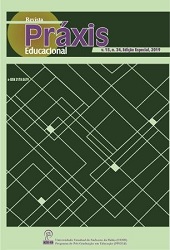EDUCACIÓN SUPERIOR EN LA PARAÍBA A LA LUZ DEL RELATÓRIO FINAL DA COMISSÃO ESTADUAL DA VERDADE (1964-1985)
DOI:
https://doi.org/10.22481/praxisedu.v15i34.5473Palabras clave:
Higher Education in Paraíba, Military dictatorship, State Commission of TruthResumen
This paper aims to disseminate the first impressions about the content of the Final Report of the State Commission OF Truth and Preservation of the Memory of the State of Paraíba (CEVPM/PB), giving special emphasis to the issue of dictatorship versus superior education in Paraíba (1964 -1985). To meet this goal, we are guided by the following questions: Why did the military dictatorship chose higher education as the privileged locus of its intervention? What is the role of truth commissions in reconstituting the historiography of higher education in the last Brazilian dictatorial cycle? Where are the references to higher education in Paraiba (1964-1985) in the CEVPM/PB Final Report? In the search for answers to these questions, we relied on the CVMPM/PB Final Report (NUNES, 2017),
which was, at the same time, an object and source of this work. The analysis of the Report, in turn, was carried out under the theoretical-methodological perspective of Pollak (1989), Germano (2011), Motta (2014), Reátegui (2011) and Fico (2004, 2014). The methodology adopted was that of bibliographical revision and analysis of the text-document of the Report, separating references to higher education in Paraíba during the validity of the military regime, in a process of unveiling and interpreting facts and speeches. The result of this investigative effort has as a preliminary result the verification of proven violations of human rights in the academic and educational areas of Paraíba. In this context, it is aligned among the writings that advocate for the diffusion of the debate so that the atrocities experienced in the years from 1964 to 1985 will never come to pass again.
Descargas
Métricas
Descargas
Publicado
Cómo citar
Número
Sección
Licencia
Usted es libre de:
Compartir — copiar y redistribuir el material en cualquier medio o formato; Adaptar — remezclar, transformar y construir a partir del material para cualquier propósito, incluso comercialmente. Esta licencia es aceptable para Obras Culturales Libres. La licenciante no puede revocar estas libertades en tanto usted siga los términos de la licencia.
Bajo los siguientes términos:
Atribución — Usted debe dar crédito de manera adecuada, brindar un enlace a la licencia, e indicar si se han realizado cambios. Puede hacerlo en cualquier forma razonable, pero no de forma tal que sugiera que usted o su uso tienen el apoyo de la licenciante.
No hay restricciones adicionales — No puede aplicar términos legales ni medidas tecnológicas que restrinjan legalmente a otras a hacer cualquier uso permitido por la licencia.










